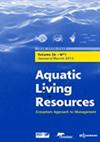Assessing technical and scale efficiencies in tilapia production: influential factors and insights
IF 1.9
4区 农林科学
Q3 FISHERIES
引用次数: 0
Abstract
This study assessed the technical and scale efficiency of tilapia farmers in Bangladesh with a focus on identifying key factors influencing their efficiency levels. Data from 199 randomly selected tilapia farmers were analyzed using Data Envelopment Analysis (DEA), followed by a Tobit regression model to determine the key variables affecting efficiency. The results revealed a mean TE of 0.77 under CRS, 0.83 under VRS, and a mean SE of 0.92, indicating that most inefficiencies were technical rather than scale-related issues. The study also identified farming training, credit access, and years of experience had a positive effect on TE, while adverse climatic conditions negatively impacted efficiency. The findings emphasize the importance of mitigating climate impacts and improving resource management to enhance efficiency. Expanding credit access, improving training programs, and taking initiatives for mitigating climate impacts could significantly improve the efficiency and long-term viability of tilapia production in the region.
评估罗非鱼生产的技术和规模效率:影响因素和见解
本研究评估了孟加拉国罗非鱼养殖户的技术和规模效率,重点是确定影响其效率水平的关键因素。采用数据包络分析(DEA)对199家罗非鱼养殖户的数据进行分析,并采用Tobit回归模型确定影响效率的关键变量。结果显示,CRS下的平均TE为0.77,VRS下的平均TE为0.83,平均SE为0.92,表明大多数效率低下是技术问题,而不是与规模相关的问题。该研究还发现,农业培训、信贷获取和多年经验对技术效率有积极影响,而不利的气候条件对效率有负面影响。研究结果强调了减轻气候影响和改善资源管理以提高效率的重要性。扩大信贷渠道、改进培训项目以及采取缓解气候影响的举措可以显著提高该地区罗非鱼生产的效率和长期生存能力。
本文章由计算机程序翻译,如有差异,请以英文原文为准。
求助全文
约1分钟内获得全文
求助全文
来源期刊

Aquatic Living Resources
农林科学-海洋与淡水生物学
CiteScore
2.30
自引率
0.00%
发文量
10
审稿时长
>24 weeks
期刊介绍:
Aquatic Living Resources publishes original research papers, review articles and propective notes dealing with all exploited (i.e. fished or farmed) living resources in marine, brackish and freshwater environments.
Priority is given to ecosystem-based approaches to the study of fishery and aquaculture social-ecological systems, including biological, ecological, economic and social dimensions.
Research on the development of interdisciplinary methods and tools which can usefully support the design, implementation and evaluation of alternative management strategies for fisheries and/or aquaculture systems at different scales is particularly welcome by the journal. This includes the exploration of scenarios and strategies for the conservation of aquatic biodiversity and research relating to the development of integrated assessment approaches aimed at ensuring sustainable and high quality uses of aquatic living resources.
 求助内容:
求助内容: 应助结果提醒方式:
应助结果提醒方式:


